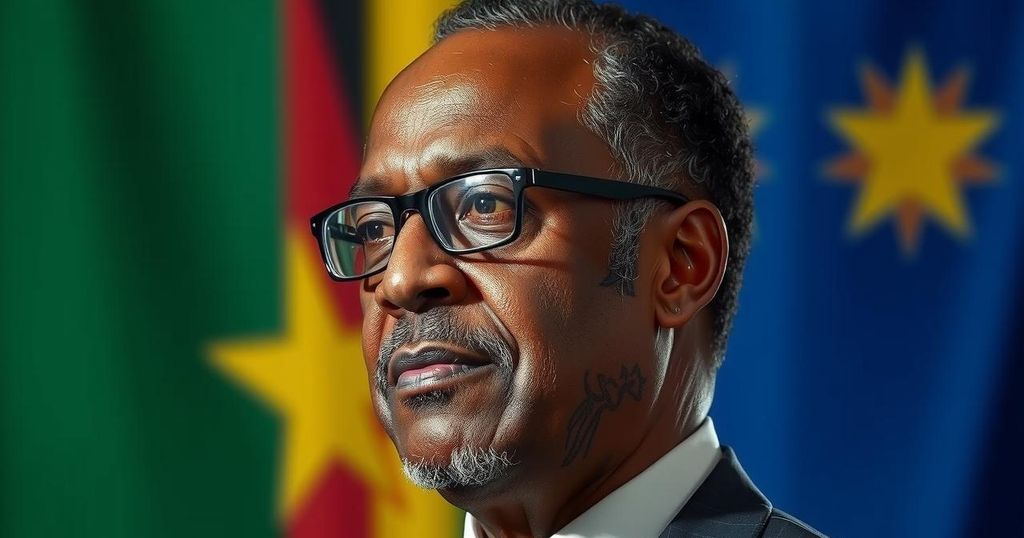Mauritius Prime Minister Jugnauth Admits Election Defeat as Opposition Prepares to Lead

Mauritius Prime Minister Pravind Jugnauth conceded defeat in the legislative elections, as opposition leader Navin Ramgoolam’s coalition is set to take power. The election was marred by a scandal but was marked by promises to address economic hardships. Ramgoolam seeks to introduce reforms to improve governance and civil liberties as he returns to the premiership for a third term.
The Prime Minister of Mauritius, Pravind Jugnauth, has publicly acknowledged his coalition’s impending defeat in the recent legislative elections. Despite the final results yet to be declared, opposition leader Navin Ramgoolam’s Alliance of Change appears poised to form the next government. Jugnauth, who has held the position since 2017, stated, “The people have chosen another team to lead the country.” The results were delayed due to election day incidents, but it is widely expected that Ramgoolam will assume power for the third time.
Not long before this election, Jugnauth celebrated recovering sovereignty over the Chagos Islands from Britain, but this election was marked by a significant scandal involving intercepted communications, which raised questions about the integrity of Mauritius’s democratic processes. In light of this, Jugnauth remarked the necessity to respect the people’s choice as voting unfolded amidst a backdrop of heightened scrutiny regarding civil liberties.
The campaign period saw both major parties promising to tackle economic inequalities, with the Alliance of Change suggesting reforms to alleviate the burdens of rising living costs. Featured in their proposals were initiatives such as creating hardship support funds, pension increases, and measures to reduce fuel costs. In an unusual political landscape, Ramgoolam, the opposition leader and son of a previous prime minister, expressed hope for victory, stating, “We are heading towards a big victory tomorrow. The people are waiting for this liberation.”
Historically, Mauritius has been viewed as a beacon of stability in the African context, yet lingering concerns around governance and corruption persist amidst its growing economy primarily founded on tourism and finance. Ramgoolam’s ascent could symbolize a shift towards a promise of renewal in Mauritian leadership, as he is eager to advance a reform agenda that engages ordinary citizens more effectively.
Furthermore, the opportunity for change comes at a pivotal moment for the nation, as the electorate seeks solutions to challenges posed by a rising cost of living amid a backdrop of economic prosperity. Ramgoolam’s call for constitutional and electoral reforms hints at the broader changes the new administration might pursue.
Mauritius, an island nation in the Indian Ocean, has been celebrated for its stable democracy and economic growth since gaining independence from Britain in 1968. The recent elections have been contentious, centering around the leadership of Prime Minister Pravind Jugnauth and opposition leader Navin Ramgoolam, both of whom descend from prominent political families. This election cycle has been further complicated by a wire-tapping scandal that raised issues about the erosion of civil liberties and democratic integrity. The country faces pressing socio-economic issues, with widespread dissatisfaction regarding the cost of living, despite a growing economy that has attracted millions of tourists annually.
In conclusion, the legislative elections in Mauritius mark a critical turning point as Prime Minister Pravind Jugnauth concedes defeat, ushering in what appears to be a transformative era under opposition leader Navin Ramgoolam. As the nation grapples with economic challenges and a shift in leadership, the implications for governance and reform will be closely observed. The evolving political landscape reflects both the resilience and aspirations of the Mauritian people, signaling their desire for a government that prioritizes their welfare and democratic engagement.
Original Source: www.bellevueheraldleader.com







